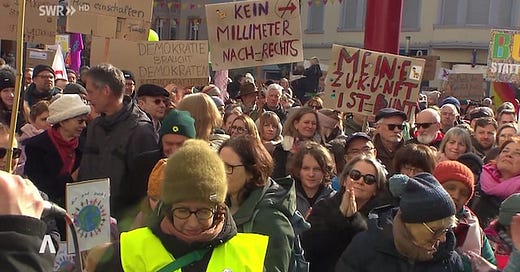Around the World
The world seems increasingly troubled, as many experts brace for a global recession and somberly warn us of an accelerated decline of democracies while oppressive violence persists in both the Middle East and Eastern Europe. One of the first responses in Western countries that reflect society’s political dissatisfaction, especially with the assistance of the World Wide Web along with popularly used social media networks, is the organization of large peaceful demonstrations.
A study by the Australian Institute of International Affairs showed that Western European protest participation is higher than (Central) Eastern European participation. The broader cause is linked to class-related disparities; post-socialist labourers participate significantly less than Western European workers due to more job insecurity and general discouragement around political participation.
It’s only natural that someone from an Eastern country may question the effectiveness of protests, but this pessimism is also observable in Western nations, where protesting is a normalized form of political expression. In a generation accustomed to performing with more permanent implications (nothing can ever be deleted from the internet), who are wired to expect instant gratification, and who were born into a society slowly drifting away from personal human connection, we are less likely to understand what triggered a large portion of society to become hippies in the ‘70s as means to stopping the war in Vietnam–one of the most successful and culturally impactful acts of counterculture in modern history.
In today’s world, many young folks view rejecting acts of displaying political positioning as “performative”, arguing that engagement is only for the sake of virtue signaling to peers. Previously, reposting an infographic on your story to 20 people could easily be dismissed as a cheap attempt to prove your moral superiority. Protesting seemed too dedicated and overdramatic for a world that is now fixating upon nonchalance.
Times are changing now, though, with countries like the US now increasingly tracking social media presences and seizing cellular devices while travellers cross the border. Not even 4 months into the current US administration, some of these cases have led to consequences like deportation and imprisonment; a heavy amount of weight has been added to those who wish to freely express criticism against those in power. In the words of Susanne Hubel, a NY immigration lawyer, “People who are very loud and open about their opinions here are starting to get in trouble.”
In the US, Americans are growing weary of fighting against the continuing infringement of their rights, specifically regarding their freedom of speech. Though some larger protests have taken place, the reaction to Trump’s second administration seems significantly tamer than the reaction to his first term, despite his actions being openly more extreme this time around. With midterms in 2026, it will be imperative to keep an eye on the governmental response to opposition and on the integrity of future elections.
The right is not just winning in the US: the day after Valentine’s Day in Heidelberg, protestors hit the streets shortly before elections took place in Germany–a country whose dark past can be directly tied to not taking action at the right time. This occurred two weeks after the proposed “Influx Limitation Law”, a law designed to slow down immigration, drafted by the majority party CDU/CSU, fell through on the parliament’s floor; this protest was a second wave.
This law, supported by the right extremist party AfD (Alternative for Germany), caused a great ruckus in Germany. Many feared that, if the CDU gained the majority, they would build a coalition with the AFD. Though the CDU did win the majority of votes, Friedrich Merz, the newly elected prime minister, has vowed to neither collaborate nor even tolerate the AfD, and the left representative party gained 25 new seats with a victorious rise in votes–perhaps public pressure did indeed work!
Though personal motivation varied, protestors on February 15 shared fear and concern. Older protesters were reminded of past mistakes from their parents’ generation, sharing that even though more action could have been taken in the 1930s, the new era of social media and the Internet, where information is widely accessible, leaves no room for excuses this time around.
Younger protestors expressed outrage and fear, stating that they were frustrated with the spread of polarizing misinformation and with mainstream politicians who may choose to side with the most shunned party of the current government. Generally, fading democracy alongside rising xenophobia, misogyny, and homophobia were listed as the protesters’ main concerns. One protester helplessly stated: “I am really afraid everything will only get worse.”
Activists become more and more ostracized as they solidify their convictions, especially those who insist on discussing what makes us most uncomfortable and defensive. A great example of this is Greta Thunberg, who, before shifting the discussion on the role of colonialism and systemic violence in manmade climate change, was embraced by many mainstream politicians and media outlets. Ever since criticizing the ingrained violence behind Western success, Greta Thunberg has had a large part of her platform ripped away by those who once embraced her as a token of change.
The perspective on protesting and general political participation is becoming just as polarized as the left and right. Whereas many people are willing to link arms and take hours out of their day to march with slogans painted across a posterboard on display, many find these displays to be a nuisance at most. On the famous forum Reddit, under the subreddit r/TrueUnpopularOpinion, one user uploaded a post with the caption: “Protesting what is happening in other countries does absolutely nothing.” The post received just above 1k upvotes as well as many affirming replies: “Absolutely, the irony is that they think they are doing something so meaningful and big, but in reality it's typically a very self serving act and agenda that people engage in to feel important and plaster on their social media.”
Perhaps there is a grain of truth that a part of protesting is indeed a form of virtual signaling, but it can equally be argued that protests are also effective. Signaling virtue also inevitably means raising awareness on whatever cause you are plastering yourself onto. Marching on the street or throwing paint on a building causes disruption and draws attention. Though not all acts of protest are always well thought out and appropriate, the broader result of causing a ruckus can be incredibly beneficial to pluralism and thus to the health of a democracy, which exists because civil opposition is expected.
So, even if all your friends post something on their story demanding your action, do it solely to prove their thoughtfulness; this form of peer pressure is still better than total silence and resignation. If you enjoy living a comfortable life and appreciate the standard of living you were born into, it's important to remember how many nameless individuals you can thank for this gift, no matter how small their individual contribution was. The audacity to broadcast your opinion is a luxury we possess thanks to those who demanded all voices mattered way before it was our society’s prerogative. Whether a real-life protest or a social media “Black-Out”, talking about any issue as much as possible could sway voters one way or another. In the words of the Washington Post: “Democracy Dies in Darkness”.





